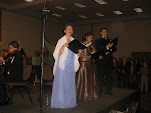The First Lesson can be exciting and nerve-wracking for both the new student and the teacher. The student, whether young or mature, may never have sung in front of anyone before, and will most likely be a little nervous. A teacher may be wondering whether the student will be good or not-- will the student follow directions, be friendly, or even sing on pitch?
I always try to make my new students feel welcome and excited about the process of the first voice lesson. By smiling, speaking clearly, looking the student in the eyes and being generally warm and friendly, the teacher can break down some of the nervous barriers that may exist between student and teacher in a first lesson.
I start an initial lesson by finding out some information about the student. Not only do I have the student fill out a "Voice Student Record" form, with basic contact info, spaces for payment records, and for notes about each lesson, but I also have them fill out a "Health Questionnaire." This is a form (parents can sign off on) for me to find out about certain health issues that may exist for the student. Allergies, orthodontics, certain surgeries and learning issues can affect how you teach and how the student learns and copes with the rigors of singing. Also, being aware of any possible condition such as hypoglycemia, diabetes, or fainting spells can directly affect your time with the student. For instance, I once had a student faint on me. Had I known that she was hypoglycemic and had a tendency to do so, I may have been able to spot the signs and have the student sit down, get a drink or eat something. Also, learning disabilities such as dyslexia and ADHD can affect the way the student learns. Knowing these potential problems can help the teacher teach the student in a more appropriate way for his or her abilities.
After the initial introduction and paperwork, I also engage the student in conversation about past musical experiences, hobbies, sports etc.* and ask the student why he/she desires to take voice lessons. Remember: your students are paying you for a service. You need to hear them out about their goals for singing and what they would like to improve.
By using good communication skills and collecting verbal and written information about the student, a teacher will have the tools necessary to get on to the reason why the student is taking voice lessons.... TO SING!
*You may also want to have a general interests form that can elaborate on the student's interests and past musical experiences. Knowing about sport, church, school activities will give you a better idea about the student's personality, and ability to make a commitment to time and practice.
Next:
The First Lesson- Part II: Get Singing!
Subscribe to:
Post Comments (Atom)




No comments:
Post a Comment